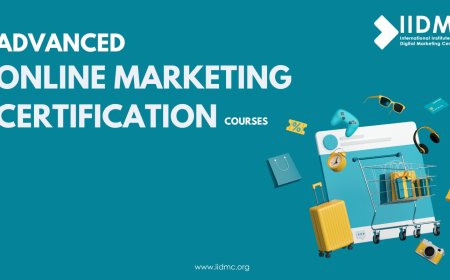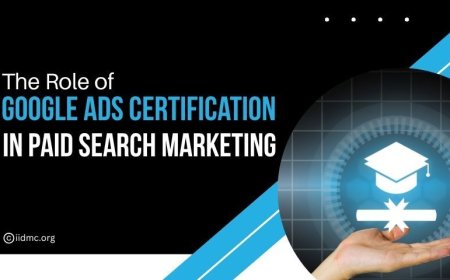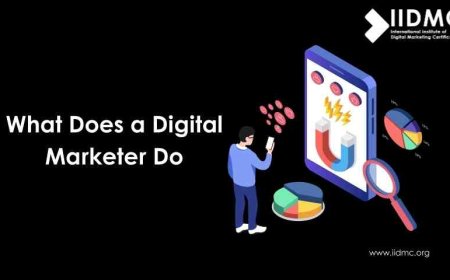Essential Digital Marketer Skills for Success
Discover the essential digital marketer skills needed for success in today's competitive landscape. Learn about SEO, content creation, social media management, and analytics to elevate your marketing career.
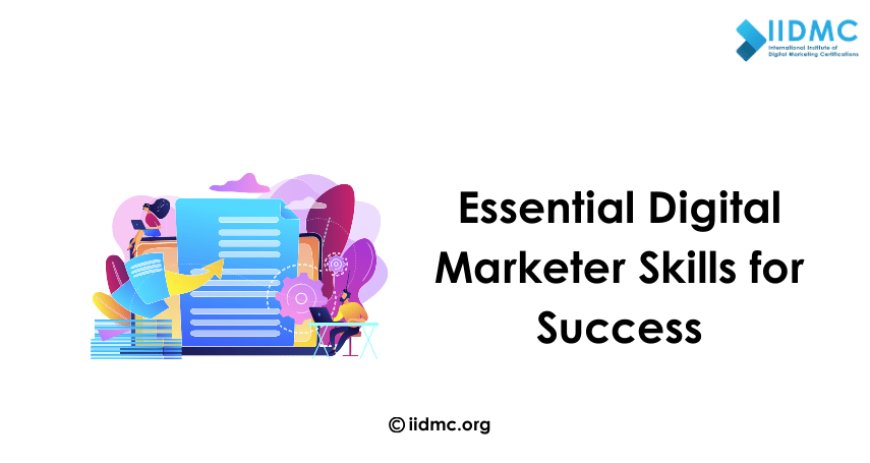
Having the right skills is crucial for any digital marketer aiming to stay ahead of the curve. With businesses increasingly shifting their focus to online platforms, a successful digital marketer must possess a blend of creativity, strategic thinking, and technical expertise. From mastering search engine optimization (SEO) to developing engaging content strategies, analyzing data based trends, and using social media platforms, each skill plays a pivotal role in creating impactful campaigns.Staying adaptable to the ever evolving digital environment ensures that marketers can respond to industry changes and improve consistent business growth. In this blog, we’ll dive into the essential skills every digital marketer needs to thrive in the competitive online space.
What is Digital Marketing?
Digital marketing includes a variety of online strategies aimed at promoting products, services, or brands to targeted audiences through digital channels. As consumer behavior increasingly shifts online, businesses must adapt to this environment.
Key components of digital marketing include:
-
Search Engine Optimization (SEO): Improves website visibility in search engine results to attract organic traffic.
-
Social Media Marketing: Engages audiences on platforms like Facebook and Instagram to build community and brand loyalty.
-
Content Marketing: Creates valuable content—such as blogs, videos, and infographics—to educate and establish authority.
-
Email Marketing: Directly communicates with customers through newsletters and promotions to nurture relationships.
-
Pay-Per-Click (PPC) Advertising: Improves traffic through paid ads, charging advertisers only when users click.
-
Analytics: Utilizes data to measure campaign performance and optimize strategies in real-time.
Digital marketing allows businesses to reach consumers where they spend their time, providing measurable results and cultivating deeper connections. It’s an essential strategy for improving engagement and growth in today’s digital world.
Importance of digital marketing
Digital marketing has become a foundation of modern business strategies, allowing companies to reach broader audiences, engage with customers, and improve growth in a highly competitive market. In today’s digital-first world, businesses use online platforms like social media, search engines, and email to connect with potential customers. This approach not only enhances brand visibility but also allows for targeted marketing, offering cost-effective and measurable results compared to traditional methods.
Mastering essential digital marketing skills, such as SEO, social media management, content creation, and data analytics, is crucial for success in this field. These skills enable marketers to craft effective campaigns, optimize digital channels, and improve conversions, ultimately contributing to a company's long-term growth and success.
Strong Analytical Abilities
In the domain of digital marketing, strong analytical abilities are essential for making informed decisions that improve business success. Understanding data allows marketers to gain insights into consumer behavior, campaign performance, and market trends. By interpreting this data effectively, marketers can identify what strategies are working, what needs adjustment, and how to allocate resources efficiently.
Tools like Google Analytics and SEMrush play a pivotal role in tracking performance. Google Analytics provides in-depth insights into website traffic, user behavior, and conversion metrics, enabling marketers to optimize their online presence. Meanwhile, SEMrush offers competitive analysis, keyword tracking, and SEO insights, helping marketers refine their strategies and stay ahead in the digital world.Together, these tools empower digital marketers to make data based decisions that enhance their campaigns and improve overall business outcomes.
SEO and SEM Knowledge
Explanation of How SEO and SEM Contribute to Digital Visibility:
SEO (Search Engine Optimization) and SEM (Search Engine Marketing) are vital for improving a brand's online visibility. SEO focuses on optimizing website content and structure to improve organic search rankings, while SEM includes paid advertising strategies to gain immediate visibility on search engine results pages (SERPs). Together, they ensure that a brand is easily discoverable by potential customers, increasing traffic and driving conversions.
Key Skills:
-
Keyword Research: Identifying relevant keywords and phrases that potential customers use to find products or services.
-
On-Page Optimization: Improving individual web pages to rank higher in search results, including meta tags, headings, and content structure.
-
Paid Search Strategies: Developing effective paid advertising campaigns, such as Google Ads, to target specific audiences and achieve measurable results.
Social Media Marketing Expertise
Significance of Building and Managing Brand Presence on Social Platforms:
Social media marketing is crucial for establishing and maintaining a brand’s online presence. It allows businesses to engage directly with their audience, build relationships, and foster brand loyalty. Effective social media strategies enhance brand awareness, Improve traffic to websites, and facilitate customer interactions.
Skills Needed:
-
Content Creation: Crafting engaging and relevant content tailored to the brand's voice and audience preferences.
-
Audience Engagement: Interacting with followers through comments, messages, and posts to build community and trust.
-
Analytics Tracking: Monitoring performance metrics to assess the effectiveness of campaigns and refine strategies for better results.
Content Creation and Copywriting
The Role of Content in Driving Engagement and Conversions:
Content is essential for engaging audiences and converting them into customers. High-quality content captures attention, educates, and inspires action, making it a powerful tool for building relationships and improving sales. By effectively communicating the brand’s message, content can guide potential customers through the buyer's journey.
Focus on Storytelling, Tone, and Brand Voice:
-
Storytelling: Crafting compelling narratives that resonate with the audience, making the brand relatable and memorable.
-
Tone: Adjusting the style of communication to match the target audience’s preferences, whether it's formal, casual, humorous, or authoritative.
-
Brand Voice: Consistently reflecting the brand’s identity across all content, ensuring it aligns with the overall marketing strategy and connects with the audience.
Email Marketing Proficiency
The Impact of Email Campaigns on Customer Retention and Lead Nurturing:
Email marketing is a powerful channel for nurturing leads and keeping customers. By delivering targeted messages directly to subscribers, businesses can keep their audience informed, engaged, and more likely to convert. Effective email campaigns foster relationships, encourage repeat purchases, and improve brand loyalty.
Skills in List Building, Segmentation, and Personalized Messaging:
-
List Building: Growing a subscriber list through effective strategies like lead magnets, sign-up forms, and incentives.
-
Segmentation: Dividing the email list into specific groups based on demographics, behavior, or interests to tailor messages more effectively.
-
Personalized Messaging: Crafting customized content that addresses the specific needs and preferences of each recipient, increasing open rates and conversions.
Paid Advertising Skills
Overview of PPC, Display Ads, and Retargeting:
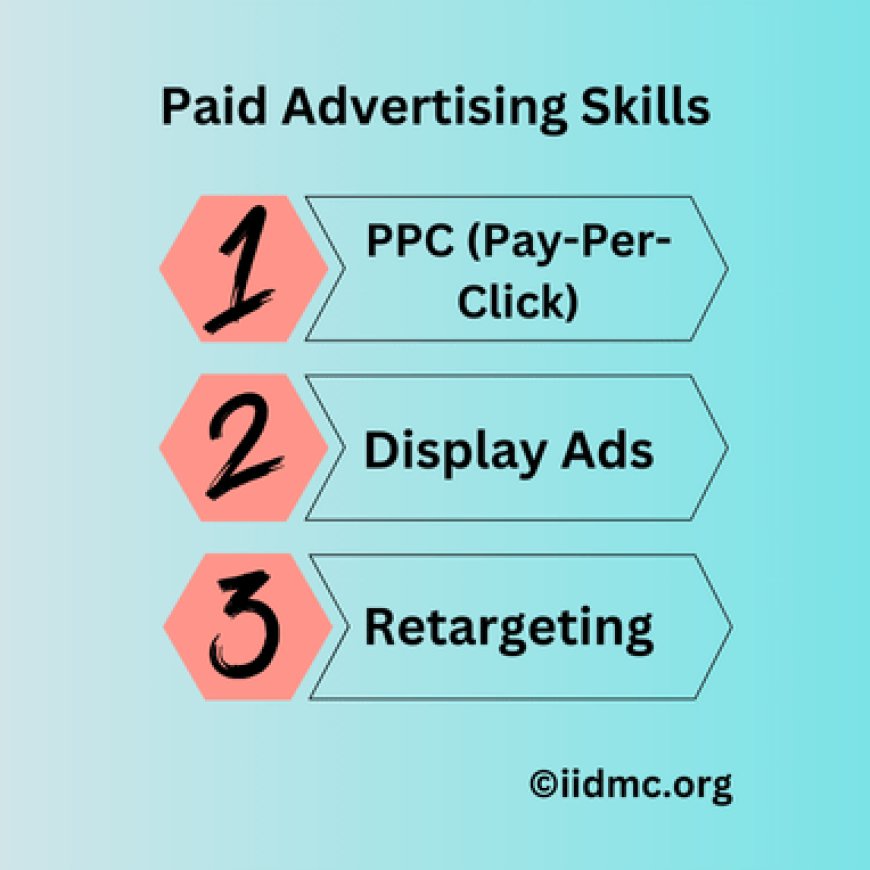
Paid advertising is a crucial component of digital marketing, offering immediate visibility and targeted outreach. Key elements include:
-
PPC (Pay-Per-Click): This model allows businesses to bid on keywords, paying only when users click on their ads. It’s an effective way to improve traffic quickly.
-
Display Ads: These visual ads appear on websites and apps, using images and banners to capture audience attention. They help in brand awareness and customer engagement.
-
Retargeting: This strategy involves displaying ads to users who have previously interacted with a brand's website or content, encouraging them to return and complete a desired action.
Importance of Budgeting, Targeting, and Ad Optimization:
-
Budgeting: Establishing clear budgets helps manage ad spending effectively and maximizes return on investment (ROI).
-
Targeting: Using demographic, geographic, and behavioral data to reach specific audiences ensures that ads resonate with the right people.
-
Ad Optimization: Continuously analyzing and refining ad campaigns based on performance metrics leads to improved effectiveness and reduced costs.
Adaptability and Learning Mindset
How the Fast-Paced Nature of Digital Marketing Requires Continuous Skill Development:
Digital marketing is an ever-evolving field that demands adaptability and a commitment to ongoing learning. New tools, techniques, and trends emerge regularly, making it essential for marketers to stay current. Embracing a learning mindset allows professionals to respond effectively to changes and maintain a competitive edge.
Staying Updated with Trends and Emerging Platforms:
-
Engaging with industry blogs, webinars, and online courses helps marketers keep up with the latest strategies and technologies.
-
Participating in professional networks and forums fosters knowledge sharing and collaboration, further enhancing skill development in a dynamic environment.
Mastering essential digital marketer skills is vital for success in today’s competitive landscape. Skills like SEO, content creation, paid advertising, and social media marketing enhance digital visibility and engagement. Additionally, being adaptable and committed to continuous learning is crucial, as the digital marketing field is always evolving.
As you work on building or refining these skills, consider exploring training programs offered by IIDMC (International Institute of Digital Marketing and Certification). Investing in your development will boost your career prospects and help you make a significant impact in digital marketing. Start your journey today for a successful future!



























